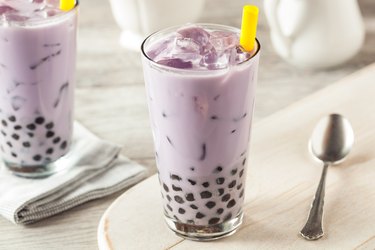
Boba milk tea, often called bubble tea or tapioca milk tea, can include any number of added ingredients, such as fruit or honey. But the starring ingredients are milk, tea and sago, which are tapioca pearls.
While milk and tea are certainly nutritious, boba milk tea typically contains a large dose of added sugar. This is something to take into consideration if it's a drink you enjoy regularly.
Video of the Day
Video of the Day
"Some boba or bubble teas can be sugar- and calorie-bombs, with upwards of five tablespoons of sugar and 300 calories in a 16-ounce serving," shares Emily Cooper, RDN of Sinful Nutrition.
Boba Milk Tea Nutrition Facts
A 16-ounce cup of boba milk tea is equal to a single serving. A 16-ounce cup of boba milk tea contains:
- Calories: 240
- Total fat: 3 g
- Cholesterol: 0 mg
- Sodium: 38.4 mg
- Total carbs: 56 g
- Dietary fiber: 0 g
- Sugar: 40 g
- Protein: 0 g
- Calcium: 38% Daily Value
Boba Milk Tea Macros
- Total fat: A 16-ounce cup of boba milk tea has 3 grams of total fat, which includes 0 grams of unsaturated fat, 3 grams of saturated fat and 0 grams of trans fat.
- Carbohydrates: A 16-ounce cup of boba milk tea has 56 grams of carbs, which includes 0 grams of fiber and 40 grams of sugar.
- Protein: A 16-ounce cup of boba milk tea has 0 grams of protein.
Health Benefits of Boba Milk Tea
The benefits of boba milk tea are very limited. The only redeeming nutritional components of the drink are the brewed tea and calcium provided.
1. Boba Milk Tea Is an Excellent Source of Calcium
A serving of boba milk tea contains 38 percent of the recommended dietary allowance for calcium. This is a mineral Americans commonly under-consume, according to the 2015-2020 Dietary Guidelines for Americans.
Calcium is needed for keeping our heart and other muscles functioning properly, hormone secretion and nerve transmission. One of its most significant roles however, is helping build the structure of our bones and teeth, as well as helping them function.
Being deficient in calcium puts you at risk for osteoporosis, or weakening of the bones.
2. It's a Source of Antioxidant-Packed Tea
Boba milk teas are made with various teas from black to green to oolong. Drinking tea is linked to helping boost your immune system, helping to reduce inflammation and even providing some protection from cancer and heart disease, according to Penn Medicine.
But, the benefits of tea are outweighed by the less healthy components of boba milk tea, like the added sugar and syrups. To reap the benefits of tea, you'd be better off enjoying a cup without any added sugar.
Boba Milk Tea Health Risks
When it comes to nutrition and health, boba milk tea leaves a lot to be desired.
1. It's High in Sugar
Boba milk teas are considered a sugar-sweetened beverage, according to a March 2016 study published in Food Science & Nutrition. A serving contains 40 grams of sugar, a majority of which is added sugars. And it's not just the sweetened teas or fruit flavorings.
"The tapioca pearls, or 'bubble' part of bubble tea are sometimes soaked in a sugar-water solution before being added to a sugar-sweetened tea beverage, which can add up to a lot of empty calories in one sitting," explains Cooper.
We overdo it when it comes to our sugar consumption, according to the Harvard T.H. Chan School of Public Health. On average, we take in about 88 grams of sugar per day. The recommended limit for women is 24 grams and for men, 36 grams of added sugars.
Studies show that liquid carbohydrates and sugars like boba milk tea are less filling than solid forms, which causes people to feeling hungry despite the number of calories consumed, per the Harvard T.H. Chan School of Public Health.
2. Food Allergies
Boba milk tea contains dairy from the added milk or creamer. If you're lactose intolerant, it's most likely that you'll want to skip this beverage unless you use a non-dairy alternative milk, like almond milk.
The boba pearls, or bubbles, are made out of tapioca pearls. Tapioca is made from the cassava root. The pearls are gluten-free, according to the Celiac Disease Foundation but you'll want to ask when buying a boba milk tea if the entire beverage is in fact gluten-free. Other added ingredients may include gluten.
The Takeaway
Bubble tea contains too much sugar to be enjoyed regularly. Consider bubble tea as you would a dessert and enjoy it sparingly and in moderation.
“If you still want to enjoy bubble tea in a healthier way, opt for an unsweetened green or black tea, or make your own at home," Cooper says. "This allows you to control how much sweetener or milk is added, and also helps to keep calories and added sugars in check."
- MyFoodData: "Boba Bubble Tea Green Tea Lychee Bobas"
- Office of Dietary Supplements: "Calcium"
- 2015-2020 Dietary Guidelines for Americans: "Underconsumed Nutrients & Nutrients of Public Health Concern"
- Food Science & Nutrition: "Calories and Sugars in Boba Milk Tea: Implications for Obesity Risk in Asian Pacific Islanders"
- Harvard Health: "Added Sugar in the Diet"
- Celiac Disease Foundation: "Tapioca Pudding"
- Penn Medicine: "The Hidden Health Benefits of Tea"